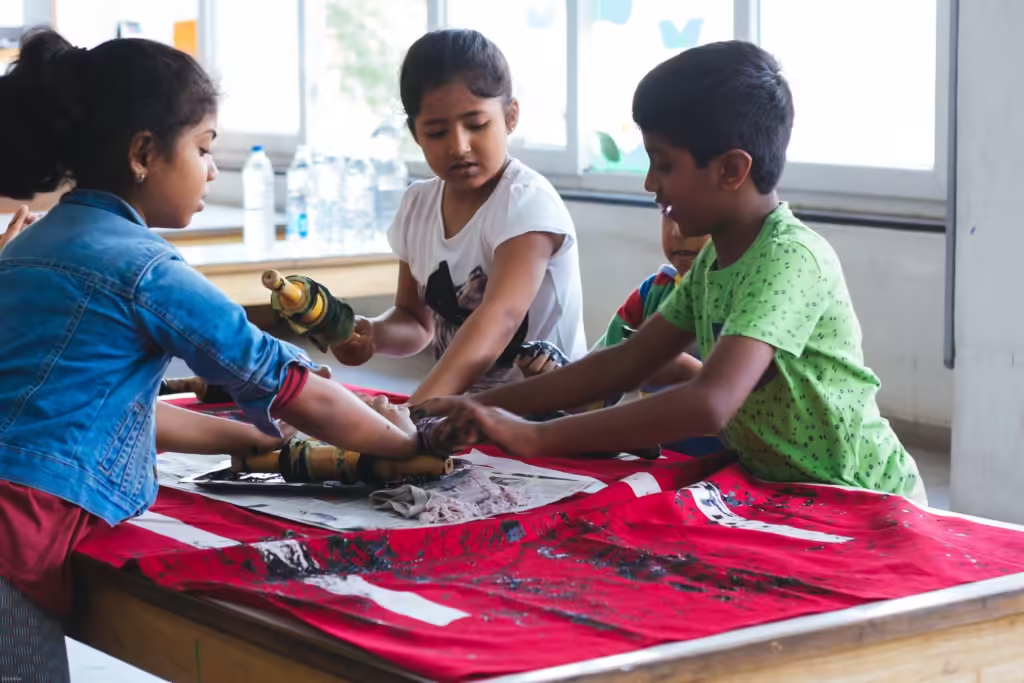Childhood is a vibrant journey filled with exploration, discovery, and, at times, emotional turbulence. As children navigate their world, they encounter a myriad of feelings—from joy and excitement to fear and sadness. Yet, articulating these emotions can often feel like an uphill battle for young minds. Understanding and expressing emotions is crucial not only for personal development but also for building relationships and enhancing learning. When children learn to recognise and communicate their feelings, they equip themselves with essential life skills that foster resilience and empathy.
At Ekya Schools, we recognise the profound impact that emotional awareness can have on a child’s overall development. By integrating emotional intelligence into our educational framework, we create an environment where children feel empowered to express themselves fully. This commitment to emotional growth will be showcased at the second edition of our annual flagship event- FIND Festival 2024, where we will host a variety of workshops designed to help children explore their emotions in creative and engaging ways
The Importance of Emotional Awareness
Emotional awareness is the ability to recognise and understand one’s own emotions and those of others. It plays a crucial role in personal development, social interactions, and academic success. When children become emotionally aware, they are better equipped to handle stress, resolve conflicts, and build positive relationships. This foundational skill enhances their overall well-being and contributes to a positive school environment.
Research has shown that emotional intelligence can significantly impact a child’s academic performance. When students can identify their emotions, they are more likely to engage in their learning, manage anxiety, and remain motivated. By integrating emotional awareness into the curriculum, we can create a more holistic educational experience that prepares children for the challenges of life beyond the classroom.
Cultivating Emotional Awareness Through PlayCultivating Emotional Awareness Through Play
Learning about emotions doesn’t have to be a serious endeavour; in fact, it can be a delightful journey filled with creativity and fun! Play is one of the most effective ways for children to explore and express their feelings in a supportive environment. Through engaging activities, children can gain a deeper understanding of their emotions while developing essential social skills. By incorporating play into emotional learning, we create opportunities for children to connect, collaborate, and communicate in ways that foster emotional intelligence and resilience.
- Emotion Charades: This interactive game allows children to act out different emotions without using words, while their peers guess what emotion is being portrayed. This activity not only enhances understanding of emotions but also fosters empathy and communication skills.

- Feelings Collage: Children can create collages using images, words, and colours that represent various emotions. This creative outlet encourages self-reflection and helps students visualise their feelings, making it easier to discuss them.
- Storytelling Sessions: Guided by skilled facilitators, children will participate in storytelling activities that focus on characters experiencing different emotions. By discussing these narratives, children can relate to the characters and gain insights into their own emotional experiences.
Building Skills for Emotional Regulation
Emotional awareness is just the beginning: it also lays the groundwork for emotional regulation—an essential skill for navigating life’s ups and downs. Our workshops will include activities aimed at teaching children how to manage their emotions effectively. Here’s how we plan to do it:
- Mindfulness Practices: Incorporating mindfulness exercises, such as deep breathing and meditation, can help children learn to centre themselves during moments of emotional distress. These techniques provide practical tools for managing anxiety and stress.
- Role-Playing Scenarios: By engaging in role-playing activities, children can practise responding to various emotional situations. This hands-on approach allows them to explore different responses and develop strategies for coping with their emotions in real life.
- Journaling for Reflection: Encouraging children to keep a feelings journal can be a powerful way to foster emotional regulation. Writing about their emotions helps children process their feelings and identify patterns, leading to greater self-awareness.
The Role of Educators and Parents
Creating a culture of emotional awareness requires collaboration between educators, parents, and the community. At the FIND Festival, we will highlight the importance of open communication about emotions. Educators will share strategies for integrating emotional awareness into daily lessons, while parents will learn how to support their children’s emotional development at home.
By working together, we can create an environment where emotional expression is valued, and children feel safe to explore their feelings. This collaborative approach not only strengthens the school community but also equips children with the tools they need to thrive emotionally and academically.
Conclusion
As we prepare for FIND Festival 2024, let’s embrace the transformative power of emotional awareness in education. By fostering emotional intelligence, we can help children navigate their emotions, build resilience, and enhance their learning experiences. Join us at the festival as we explore these engaging activities and celebrate the importance of emotional awareness in shaping well-rounded individuals.
